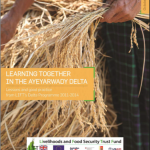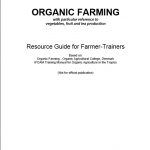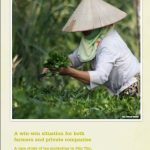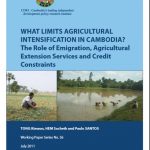8 downloads
Title of document: Farmland policies for young generation in Myanmar: Purchasing and Leasing Authors: Mar Mar Kyu Journal’s name if any: Ministry/Government Agency/Organisation: Year of publication: Geographic focus: Myanmar Main issues / topics addressed (for example: Country Profile of Myanmar; Land resources of Myanmar; Overview of Agriculture in Myanmar; Agricultural land in Myanmar …) School of agroecology (if any): Web address to original document (if any): Summary: The Union Parliament of the Republic of Union of Myanmar enacted The Vacant, Fallow and Virgin Lands Management Law and The Farmland Law in 2012. And also The Law of Protection of the Farmer Rights and Enhancement of their Benefits was enacted in 2013. These laws are encouraging to the farmers and the young generation because they become to have rights to own, mortgage, heir, rent, exchange and perform other economic practices. Read More

5 downloads
Title of document: Learning together in the Ayeyarwady Delta: Lessons and Good Practices Authors: U Htet Kyu; Libera Antelmi-Dazio and Shagun Gupta Journal’s name if any: Ministry/Government Agency/Organisation: LIFT Year of publication: Geographic focus: Myanmar Main issues / topics addressed (for example: Agricultural Production and Post-Harvest Management; Integrating farmers in the rice value chain; Turning Income Generating Activities into Profitable Business…) School of agroecology (if any): Web address to original document (if any): Summary: This document compiles lessons and good practices that arose from implementation of the Delta 2 Programme, funded by the Livelihoods and Food Security Trust Fund (LIFT). The lessons were presented by implementing partners during Learning Alliance workshops held in Bogale and Yangon on 1st and 3rd October 2014 respectively. The purpose of this report is to share the experiences of LIFT’s partners in the implementation of their projects during Delta 2. The report presents lessons shared at a series of workshops organised by LIFT in October 2014, focusing on agricultural production and post-harvest loss reduction, integrating farmers in the rice value chain, making income generation activities profitable, organising collective services. Participants also shared their experience of hire-purchase models, market price information and agricultural finance. Read More
9 downloads
Title of document: A Vietnamese agricultural cooperative’s involvement in the food safety value chain: Perspective and Policy Authors: Dr. Dao The Anh Journal’s name if any: Ministry/Government Agency/Organisation: CASRAD and FCRI Year of publication: Geographic focus: Vietnam Main issues / topics addressed (for example: Status of agricultural cooperatives in the transition process under the Cooperatives Law 2012; Real situation of cooperatives involving in food safety value chain…) School of agroecology (if any): Web address to original document (if any): Summary: The government is promoting a value chain linkage model aimed at ensuring safe food supply to consumers by using VietGAP certification. Currently there are about 557 supply chains have been voluntarily certified around the country. Agricultural cooperatives play an important role in these safe food supply chains with contribution of 27% in the total of certified chains. In particular, agricultural cooperatives play the role of organizing production for small scale farmers, common quality certification, common market access and linking with businesses in the value chain. However, the new type of cooperative has many difficulties in management capacity, access to capital and land so the scale of operation is small and the sustainability is low. In the future, the state needs realize policy to create a fair business environment for cooperatives, promote capacity strengthening and also changing the credit assess condition for agricultural cooperatives. Read More
4 downloads
Title of document: New Policies for Supporting Private Agricultural Investments and Supplemental Regulations on the Use of Rice Land for Agricultural Commodity Production in Vietnam Authors: Dr. Dao The Anh, Nguyen Ngoc Mai Journal’s name if any: Ministry/Government Agency/Organisation: VAAS Year of publication: 2018 Geographic focus: Vietnam Main issues / topics addressed (for example: Some policies for promoting agricultural production and rural development…) School of agroecology (if any): Web address to original document (if any): Summary: Vietnam in the past 30 years has implemented successful policies of national food security. The country has even become an ASEAN leading exporter of agricultural products. Nevertheless, Vietnam today is facing challenges of modernizing its agriculture to serve its integration into the international market. The government, hence, has issued a number of policies in order to promote the socialization of private investments in agriculture and rural areas. Although most of the agricultural lands for a long time have been used for rice cultivation, the income of rice growers is reducing. This situation urges the need of converting a part of rice paddies into higher value crops. The new policies for management of this type of land therefore have been promulgated to ensure both objectives of national food security and income improvement for farmers. Read More
6 downloads
Title of document: Smallholder Farmer Policy Support Review: Lessons from Vietnam Authors: Dr. Dao The Anh Journal’s name if any: Ministry/Government Agency/Organisation: VAAS Year of publication: 2018 Geographic focus: Vietnam Main issues / topics addressed (for example: Agricultural policy context based on household economic; Review of Agricultural policy supporting smallholders since Renovation; …) School of agroecology (if any): Web address to original document (if any): Summary: The lessons learnt from government support policy for a success story of small farm development in Vietnam since 30 years was divided into two phases.The first phase was the food security at different level during 1988-2008 and The second phase policy to support small farm during 2008-2017 Read More

58 downloads
Title of document: Resource Guide for Farmer-Trainers _ Based on: Organic Farming - Organic Agricultural College, Denmark IFOAM Training Manual for Organic Agriculture in the Tropics Authors: Koen den Braber Journal’s name if any: Ministry/Government Agency/Organisation: ADDA Organic project Year of publication: 2007 Geographic focus: Vietnam Main issues / topics addressed (for example: Introduction; The Living Soil; Soil and Water Management; Farm Nutrient Balance; Plant Nutrition - Keeping the Balance…) School of agroecology (if any): Web address to original document (if any): Summary: Organic farming tries to work with nature as much as possible. This applies both to the crops and animals, which provide the basis for our survival, as well as the surrounding natural environment Organic agriculture constitutes only a small portion in the world's agriculture, rarely constituting a few percent of a country's farming sector. Governmental support for research, extension or marketing in organic farming is still very low in most countries. Nevertheless, organic farming at present has promising growth rates all over the world Read More

5 downloads
Title of document: A win-win situation for both farmers and private companies “A case study of tea marketing in Phu Tho, Vietnam” Authors: Vredeseilanden/VECO Journal’s name if any: Ministry/Government Agency/Organisation: Vredeseilanden/VECO Year of publication: 2013 Geographic focus: Vietnam Main issues / topics addressed (for example: Tea sector Vietnam; The tea chain in Yen Lap district; Towards a business organization, high quality and good price; Results and future perspectives…) School of agroecology (if any): Web address to original document (if any): Summary: Tea is the second most popular drink in the world, after water. For a number of developing countries, including Vietnam, tea is an important commodity in terms of jobs and export earnings. However, as with many other agricultural commodities, real primary producer prices have fallen dramatically over the last three decades. VECO is active in Yen Lap district, Phu Tho province, where tea is a major crop, often accounting for over 40% of family income. Chain development is seen as an approach which can improve the quality of the tea by developing strong market linkages and collective actions, resulting in a better income for farmers. Read More
7 downloads
Title of document: Income Distribution in Vietnam’s Rice Value Chain Authors: Tran Cong Thang Journal’s name if any: Ministry/Government Agency/Organisation: IPSARD Year of publication: 2017 Geographic focus: Vietnam Main issues / topics addressed (for example: Introduction; Distribution of profits in the domestic rice value chain; Distribution of profits in the value chain of rice export ; Conclusion…) School of agroecology (if any): Web address to original document (if any): Summary: The main actors in the Vietnamese rice value chain are farmers (paddy growers), traders, processors (drying, milling, polishing), and food trading and export enterprises. Of these, many export enterprises have owned milling and polishing systems to meet the conditions of rice export in accordance with Decree 109/2010/ND-CP. In this case, the export enterprises have also played the role of processors as well as exporters in the value chain Read More

7 downloads
Title of document: What limits agricultural intensification in Cambodia? The Role of Emigration, Agricultural Extension Services and Credit Constraints Authors: TONG Kimsun, HEM Socheth and Paulo SANTOS Journal’s name if any: Ministry/Government Agency/Organisation: CDRI Year of publication: 2011 Geographic focus: Cambodia Main issues / topics addressed (for example: Introduction; Literature review; Data; Empirical approach and estimates; Conclusion …) School of agroecology (if any): Web address to original document (if any): Summary: This paper attempts to define the factors which determine emigration and rice doublecropping, i.e. rice cultivation on the same plot twice per year, by rural households in Cambodia, and investigates whether these decisions influence each other using data from a two-period panel survey of 231 households in three provinces in rural Cambodia. In the analysis, we take into account possible correlation between these decisions (through estimating a seemingly unrelated bivariate probit model) and unobserved heterogeneity among farmers (through estimating a random-effects probit model). It is found that rice double-cropping and emigration decisions are not closely inter-related. We can also conclude that the availability of water and agricultural land are the key determinants of rice double-cropping. Households which rely on animal draught power for agricultural production are unlikely to engage in rice double-cropping. Policies aimed at increasing irrigation and providing socioeconomic land concessions in rural areas may play a critical role in improving agricultural production. Read More
73 downloads
Title of document: Current Use of Pesticides in the Agricultural Products of Cambodia Authors: Visarto Preap and Kang Sareth Journal’s name if any: Ministry/Government Agency/Organisation: MAFF Year of publication: Geographic focus: Cambodia Main issues / topics addressed (for example: Introduction; Pesticide use; Feature actions; Conclusion…) School of agroecology (if any): Web address to original document (if any): Summary: Lack of law enforcement to farmers especially those who greatly depend on using pesticides created a big challenge for pesticide management in Cambodia; banned and restricted pesticides are widely available in the local markets. Counterfeit and illegal pesticide products are often found in unregistered pesticide shops/retailers. To fight against these challenges Cambodia shall take priority actions: improve border inspection on circulation of pesticides, and strengthening pesticide management law. Read More

 Asia & Mekong Region
Asia & Mekong Region  Cambodia
Cambodia  Laos
Laos  Myanmar
Myanmar  Other
Other  Vietnam
Vietnam